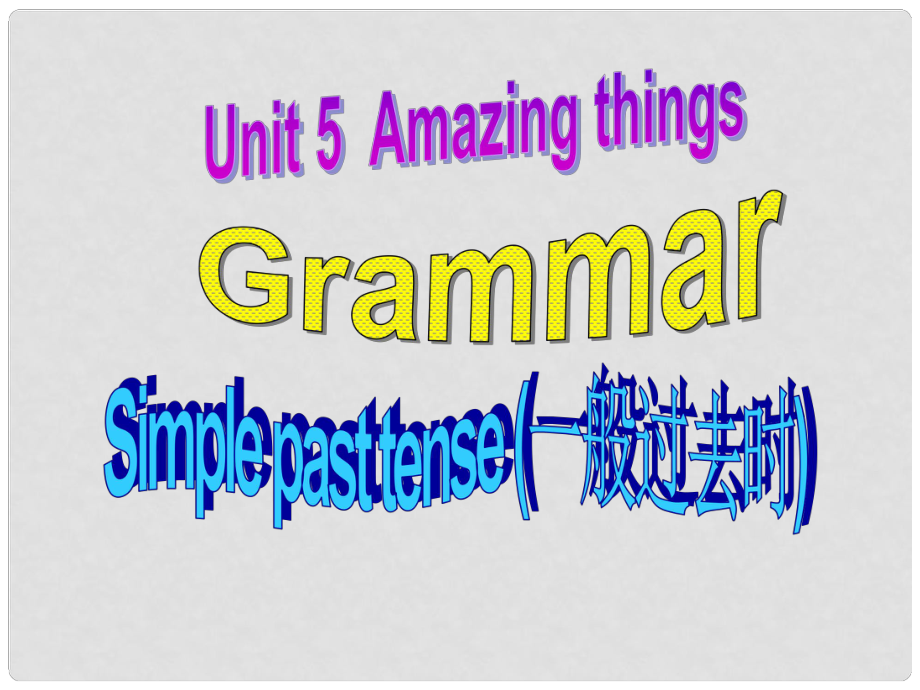《江蘇省無錫市長安中學七年級英語下冊《Unit 5 Amazing things》Grammar課件 (新版)牛津版》由會員分享�,可在線閱讀,更多相關(guān)《江蘇省無錫市長安中學七年級英語下冊《Unit 5 Amazing things》Grammar課件 (新版)牛津版(22頁珍藏版)》請在裝配圖網(wǎng)上搜索�。
1、1. We use the simple past tense to talk about things in the past. 一�、什么情況下使用一般過去時一���、什么情況下使用一般過去時? ? went是是go在一般進去時中所用的在一般進去時中所用的動詞形式動詞形式, 是是go的過去式��。的過去式�����。 A month ago, Millie and Amy went to Sunshine Park. 一個月前��,米莉和艾米一個月前�����,米莉和艾米去了去了陽光公園�。陽光公園。 Last Sunday, they went to the park again. 上個星期天上個星期天, 她們又她們又去了去
2�����、了那兒���。那兒�。2. We form the simple past tense by adding -ed to regular verbs.提示:一般過去時常與表示過去的提示:一般過去時常與表示過去的時間狀語連���,如:時間狀語連�,如:yesterday, last night, a month ago, yesterday afternoon, last week, ten years ago 1 絕大多數(shù)動詞絕大多數(shù)動詞+edwalkwalked2以以e結(jié)尾的動詞結(jié)尾的動詞+dlivelived3以輔音字母以輔音字母+y結(jié)結(jié)尾的動詞尾的動詞變變y為為iedcrycried4以一個元音字母以一
3�����、個元音字母+一個輔音字母一個輔音字母結(jié)尾的短動詞結(jié)尾的短動詞雙寫末雙寫末尾的輔尾的輔音字母音字母+edstopstopped二���、規(guī)則動詞過去式的構(gòu)成方法二����、規(guī)則動詞過去式的構(gòu)成方法提示提示: 以元音字母以元音字母+y結(jié)尾的動詞結(jié)尾的動詞按第一條規(guī)則,即:按第一條規(guī)則�,即:+ed, 如如: stay stayedwant talk like worry try stop wanted talked liked worried tried Stopped寫出下列動詞的過去式。寫出下列動詞的過去式�。 三、不規(guī)則動詞的過去式不是加三��、不規(guī)則動詞的過去式不是加ed 構(gòu)成的構(gòu)成的, 需要我們記住它們��。不規(guī)
4��、則需要我們記住它們�����。不規(guī)則動詞的過去式歸納起來有這樣幾種動詞的過去式歸納起來有這樣幾種類型類型(見下表見下表):1與原形一樣與原形一樣, 沒沒有變化有變化cost-cost put-put 2改變了元音改變了元音write-wrote know-knew3改變了輔音改變了輔音make-made spend-spent4元音和輔音都變元音和輔音都變化了化了leave-left teach-taughtInfinitive Past tenseam is wasare werebegin beganbreak brokebring broughtbuild builtbuy boughtcan c
5��、ouldInfinitive Past tensecatch caughtcome camedo diddraw drewdrink drankdrive droveeat atefall fell1)肯定句肯定句 主語主語+謂語動詞過去式謂語動詞過去式 He heard a whisper. They went to the park again last Sunday.四�����、謂語動詞為實義動詞的一般過四��、謂語動詞為實義動詞的一般過去時的句子結(jié)構(gòu)去時的句子結(jié)構(gòu)2) 否定句否定句 主語主語 + didnt +謂語動原形謂語動原形 I didnt go to the park yesterday
6�����、morning. He didnt hear a whisper. They didnt find anything in the bushes. 3)一般疑問句一般疑問句 Did +主語主語+謂語動原形謂語動原形? Yes, 代詞代詞+did. / No, 代詞代詞+ didnt. Did you go to the park yesterday morning? Yes, I did. Did he hear a whisper? No, he didnt.1. start _2. love _3. play _4. plan _9. leave _10. tell _11. stand
7����、_12. bring _5. reply _6. say _7. meet _8. hear _startedplayedlovedplannedsaidrepliedleftmetstoodtoldheardbroughtFinish Part A on page 62.This morning, we _ (go) to the Fun World Museum. When we _ (get) to the museum, there _ (be) a lot of people there. We _ (spend) three hours in the museum. I _ (ta
8、ke) a lot of photos. Some of us _ (buy) cards of the animals there. We _ (come) back to school at 1 p.m. We _ (have) a great time!wentwerespenttookboughtcamehadgotFinish Part B on page 62.Millie: We _ (go) to the Fun World Museum the day before yesterday, Daniel. It _ (be) so interesting!Daniel: Rea
9�、lly? Tell me all about it. Millie: OK. We _ (see) a small monkey, only 11 centimetres tall.Daniel: Thats amazing! What else?Millie: We also _ (learn) about some strange birds like dodos. They _ (live) on the earth a long time ago.Daniel: Thats cool!wentsawwaslearntlivedFinish Part C on page 62.Do mo
10、re exercises.She waited for me.He watched TV.He played basketball.Micky danced happily.She went to school.1. Lucy did her homework at home.(改否定句改否定句) Lucy _ _ her homework at home.2. He found some meat in the fridge. (變一般疑變一般疑問句問句) _ he _ _ meat in the fridge?3. She stayed there for a week. (對劃線部分提問
11�、對劃線部分提問) _ _ _ she _ there?4. There was some orange in the cup. (變一般疑變一般疑問句問句) _ there _ orange in the cup? didnt do Did find any How long did stay Was any改寫句子。改寫句子��。動詞一般過去時�����,表示過去發(fā)生的事����;動詞一般過去時,表示過去發(fā)生的事��;be用用was或用或用were, have, has變變had�����;謂語動詞過去式,過去時間做標志���;謂語動詞過去式�,過去時間做標志����;一般動詞加一般動詞加-ed,若是特殊得硬記�����。�����,若是特殊得硬記��。否定句很簡單���,主語之后否定句很簡單���,主語之后didnt添�;添��;疑問句也不難��,疑問句也不難���,did放在主語前;放在主語前��;如果謂語之前有如果謂語之前有did�,謂語動詞需還原;����,謂語動詞需還原;動詞若是動詞若是was, were, 否定就把否定就把not添����。添。Homework1. Learn the irregular verbs by heart. 2. Do some translations.
 江蘇省無錫市長安中學七年級英語下冊《Unit 5 Amazing things》Grammar課件 (新版)牛津版
江蘇省無錫市長安中學七年級英語下冊《Unit 5 Amazing things》Grammar課件 (新版)牛津版

